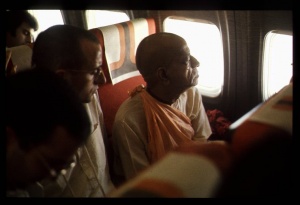SB 5.13.15: Difference between revisions
m (1 revision(s)) |
No edit summary |
||
| Line 1: | Line 1: | ||
{{info | {{info | ||
|speaker= | |speaker=Jaḍa Bharata | ||
|listener=King | |listener=King Rahūgaṇa | ||
}} | }} | ||
[[Category:Srimad-Bhagavatam - Canto 05 Chapter 13]] | |||
[[Category:Bhagavatam Verses Spoken by Jada Bharata - Vanisource|051315]] | |||
<div style="float:left">'''[[Srimad-Bhagavatam]] - [[SB 5|Fifth Canto]] - [[SB 5.13: Further Talks Between King Rahugana and Jada Bharata|Chapter 13: Further Talks Between King Rahūgaṇa and Jaḍa Bharata]]'''</div> | |||
<div style="float:right">[[File:Go-previous.png|link=SB 5.13.14]] '''[[SB 5.13.14]] - [[SB 5.13.16]]''' [[File:Go-next.png|link=SB 5.13.16]]</div> | |||
{{RandomImage}} | |||
==== TEXT 15 ==== | ==== TEXT 15 ==== | ||
<div class="verse"> | |||
<div | :manasvino nirjita-dig-gajendrā | ||
manasvino nirjita-dig-gajendrā | :mameti sarve bhuvi baddha-vairāḥ | ||
mameti sarve bhuvi baddha-vairāḥ | :mṛdhe śayīran na tu tad vrajanti | ||
mṛdhe śayīran na tu tad vrajanti | :yan nyasta-daṇḍo gata-vairo 'bhiyāti | ||
yan nyasta-daṇḍo gata-vairo 'bhiyāti | |||
</div> | </div> | ||
| Line 17: | Line 22: | ||
==== SYNONYMS ==== | ==== SYNONYMS ==== | ||
<div class="synonyms"> | |||
<div | ''manasvinaḥ''—very great heroes (mental speculators); ''nirjita-dik-gajendrāḥ''—who have conquered many other heroes as powerful as elephants; ''mama''—my (my land, my country, my family, my community, my religion); ''iti''—thus; ''sarve''—all (great political, social and religious leaders); ''bhuvi''—in this world; ''baddha-vairāḥ''—who have created enmity among themselves; ''mṛdhe''—in battle; ''śayīran''—fall dead on the ground; ''na''—not; ''tu''—but; ''tat''—the abode of the Supreme Personality of Godhead; ''vrajanti''—approach; ''yat''—which; ''nyasta-daṇḍaḥ''—a sannyāsī; ''gata-vairaḥ''—who has no enmity throughout the whole world; ''abhiyāti''—attains that perfection. | ||
</div> | </div> | ||
| Line 25: | Line 29: | ||
==== TRANSLATION ==== | ==== TRANSLATION ==== | ||
<div class="translation"> | |||
<div | |||
There were and are many political and social heroes who have conquered enemies of equal power, yet due to their ignorance in believing that the land is theirs, they fight one another and lay down their lives in battle. They are not able to take up the spiritual path accepted by those in the renounced order. Although they are big heroes and political leaders, they cannot take to the path of spiritual realization. | There were and are many political and social heroes who have conquered enemies of equal power, yet due to their ignorance in believing that the land is theirs, they fight one another and lay down their lives in battle. They are not able to take up the spiritual path accepted by those in the renounced order. Although they are big heroes and political leaders, they cannot take to the path of spiritual realization. | ||
</div> | </div> | ||
| Line 32: | Line 35: | ||
==== PURPORT ==== | ==== PURPORT ==== | ||
<div class="purport"> | |||
Big political leaders might be able to conquer equally powerful political enemies, but unfortunately they cannot subdue their strong senses, the enemies that always accompany them. Not being able to conquer these nearby enemies, they simply try to conquer other enemies, and ultimately they die in the struggle for existence. They do not take to the path of spiritual realization or become ''sannyāsīs''. Sometimes these big leaders take up the guise of a ''sannyāsī'' and call themselves ''mahātmās'', but their only business is conquering their political enemies. Because they spoil their lives with the illusion of "this is my land and my family," they cannot progress spiritually and attain liberation from the clutches of ''māyā''. | |||
</div> | |||
<div | <div style="float:right; clear:both;">[[File:Go-previous.png|link=SB 5.13.14]] '''[[SB 5.13.14]] - [[SB 5.13.16]]''' [[File:Go-next.png|link=SB 5.13.16]]</div> | ||
__NOTOC__ | |||
</div> | __NOEDITSECTION__ | ||
__NOTOC__ | |||
Revision as of 14:24, 16 May 2021

A.C. Bhaktivedanta Swami Prabhupada
TEXT 15
- manasvino nirjita-dig-gajendrā
- mameti sarve bhuvi baddha-vairāḥ
- mṛdhe śayīran na tu tad vrajanti
- yan nyasta-daṇḍo gata-vairo 'bhiyāti
SYNONYMS
manasvinaḥ—very great heroes (mental speculators); nirjita-dik-gajendrāḥ—who have conquered many other heroes as powerful as elephants; mama—my (my land, my country, my family, my community, my religion); iti—thus; sarve—all (great political, social and religious leaders); bhuvi—in this world; baddha-vairāḥ—who have created enmity among themselves; mṛdhe—in battle; śayīran—fall dead on the ground; na—not; tu—but; tat—the abode of the Supreme Personality of Godhead; vrajanti—approach; yat—which; nyasta-daṇḍaḥ—a sannyāsī; gata-vairaḥ—who has no enmity throughout the whole world; abhiyāti—attains that perfection.
TRANSLATION
There were and are many political and social heroes who have conquered enemies of equal power, yet due to their ignorance in believing that the land is theirs, they fight one another and lay down their lives in battle. They are not able to take up the spiritual path accepted by those in the renounced order. Although they are big heroes and political leaders, they cannot take to the path of spiritual realization.
PURPORT
Big political leaders might be able to conquer equally powerful political enemies, but unfortunately they cannot subdue their strong senses, the enemies that always accompany them. Not being able to conquer these nearby enemies, they simply try to conquer other enemies, and ultimately they die in the struggle for existence. They do not take to the path of spiritual realization or become sannyāsīs. Sometimes these big leaders take up the guise of a sannyāsī and call themselves mahātmās, but their only business is conquering their political enemies. Because they spoil their lives with the illusion of "this is my land and my family," they cannot progress spiritually and attain liberation from the clutches of māyā.